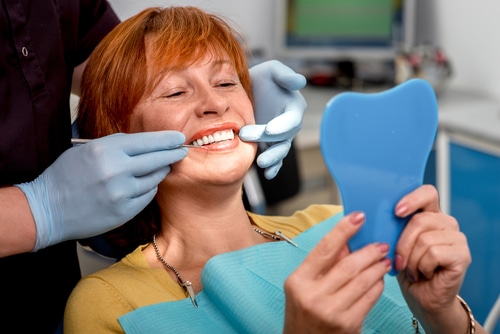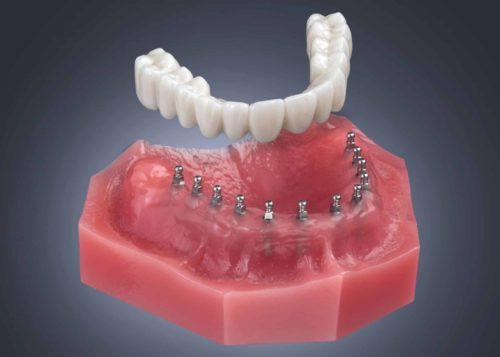Dentures in Harrisburg, NC
Losing your teeth is a hardship we often underestimate until it affects our lives, but you don’t have to accept a painful bite or displeasing smile. If you are missing teeth, you aren’t alone: 21% of North Carolinians over age 65 have complete tooth loss. Whether you have lost teeth due to advanced gum disease, decay, erosion from gastrointestinal reflux, or dental trauma, dentures can give you back the ability to eat, chew, and speak with confidence.
While traditional tooth replacement options can help fill the gap in your smile, Dr. David P. Ney, DDS, offers expert placement of implant dentures, allowing you to reap the benefits of mini implants to secure and stabilize your replacement teeth.
When Should I Consider Dentures?
 Dentures are a well-known solution to missing teeth, but if you have never had them before, you may have some questions.
Dentures are a well-known solution to missing teeth, but if you have never had them before, you may have some questions.
Some patients wonder if they really need to replace their missing teeth. To maintain your oral health, you need to fill the gaps in your mouth. If you have remaining teeth, you cause them excessive strain when eating because the force of your bite isn’t spread over the proper surface area.
This extra pressure can damage healthy teeth and compromise oral health over time. In fact, food that becomes lodged in gaps can cause decay and even gum disease.
If you don’t have any teeth, you already know that eating, chewing, and speaking is difficult, but failing to replace missing teeth can alter the appearance of your face.
An important job for your tooth roots is to stimulate the jawbone so that it continues to produce bone cells. However, when you lose teeth, this situation no longer occurs. Over time, the jaw recedes and creates a drooping appearance due to facial collapse.
Patients also wonder if they will need to have teeth removed to get dentures, but this depends on the condition of their teeth. In some instances, teeth that cannot be saved, such as those that are severely decayed, will need to be extracted before dentures can be placed.
If you need teeth removed, Dr. Ney will fit you with an immediate denture after the extraction. The temporary denture is replaced with the custom denture once the extraction site has healed.
Generally speaking, dentures are an excellent treatment if you are missing teeth that cannot be replaced with a bridge or implant-supported crown. For many people with advanced tooth loss, dentures are the answer.
Types of Dentures
While there are several denture types, Dr. Ney will help you determine the best option based on the number of teeth you are missing, the location and size of the gaps, and the condition of any remaining teeth and jawbone.
Traditional denture options include full and partial dentures, but mini dental implants have transformed the landscape of dentistry, making implant dentures an excellent option for many patients.
Full
For those with significant tooth loss, full dentures replace an entire arch of teeth on the upper or lower jaw (or both). Made from a row of artificial teeth atop a gum-colored base, this traditional option is likely what you imagine when you picture a denture.
To create traditional full dentures, Dr. Ney will take an impression of your teeth, gums, and jaw so that a model can be made of your mouth. Your denture is created in a lab and customized to the specifics of your mouth.
The aim, of course, is for the denture to fit perfectly by resting on your gums, lower jaw, or roof of your mouth for support. However, a common complaint of traditional dentures is that the appliance feels loose or even falls out when eating or speaking.
Some patients use an additional adhesive to keep their dentures secure, but these adhesives can be messy and make cleaning difficult.
Partial
Partial dentures are another traditional option, similar to full dentures in construction. Unlike full dentures, partial dentures are used for patients with some healthy natural teeth remaining that can be used as support structures.
However, partial dentures can damage your natural teeth by putting too much pressure on them. Plaque can also build up around the support teeth, causing decay and compromising your gum health.
Implant Dentures
 Implant dentures use the power of mini dental implants to anchor your denture. Mini implants are small titanium posts—measuring less than 3 mm in diameter—that screw into your jawbone in a minimally invasive procedure. Atop the post is a ball that sits above your gumline. Using this ball as a connection point, Dr. Ney will secure your denture to the implant using rubber O-rings.
Implant dentures use the power of mini dental implants to anchor your denture. Mini implants are small titanium posts—measuring less than 3 mm in diameter—that screw into your jawbone in a minimally invasive procedure. Atop the post is a ball that sits above your gumline. Using this ball as a connection point, Dr. Ney will secure your denture to the implant using rubber O-rings.
The number of implants Dr. Ney will use to stabilize your denture will depend on whether you are receiving upper or lower dentures (or both) and the unique features of your mouth. Implant dentures come in both removable and fixed options.
Implant-retained dentures are like traditional dentures in that they are removable. These dentures snap on and off the implants for easy cleaning and often require fewer implants than the fixed option. However, the rubber-O ring may show greater wear with frequent removal.
Implant-supported dentures are dentures that are permanently fixed to the implant. Due to this anchoring method, only Dr. Ney can remove the denture. While implant-supported dentures provide the most permanent option, they require more meticulous cleaning to maintain them.
The Benefits of Implant Dentures
Compared to traditional dentures, implant dentures provide several important benefits:
- More natural feel: Adapting to the feel of traditional dentures can be difficult. While they are custom-made to fit your mouth, their stability relies on suction. There’s an adjustment phase as you learn how to eat and speak with the appliance in your mouth. With dentures anchored by mini dental implants, you won’t experience the same adjustment issue; the appliance will feel more like natural teeth.
- Stronger bite force: With implant dentures, pressure is spread over the titanium implants as you chew, relieving stress from your gums and natural teeth. Compared to traditional alternatives, implant dentures give you a stronger bite force, allowing you to continue eating your favorite foods.
- Better fit: Implant dentures provide an enhanced fit and feel compared to traditional options. Because the implant is permanently fixed to the jawbone with durable titanium, implant dentures don’t get loose over time. With traditional dentures, you risk the prosthetic shifting or even falling out when you eat, speak, yawn, or cough. The slipping of conventional dentures loosens them over time and can cause soreness as well as a misaligned bite. These drawbacks simply don’t exist when mini dental implants are used.
- Greater bone health: Dental implants not only support prosthetic teeth but also replace the lost tooth root. This artificial root is important in stimulating your jawbone so that you don’t lose structure in your jaw. As a result, you’ll be able to maintain your bone health and preserve your facial appearance.
- Swift solution: While Dr. Ney takes his time to ensure that your implant dentures are expertly inserted, he can often place your mini implants and mount your dentures in a single office visit. Most patients will be able to resume normal activities in as little as 24-48 hours.
Restore Your Smile with Implant Dentures
While tooth loss is a serious issue, dentures can help restore your quality of life. Though conventional denture options come with some drawbacks, these can be remedied using mini implants.
You don’t have to deal with the frustration and embarrassment of slipping dentures. With revolutionary implant dentures, you’ll feel confident eating and speaking while still looking like you.
An expert in mini dental implants in Harrisburg, NC, Dr. David P. Ney, DDS, can help you regain your smile and restore your bite. Contact us today to request a complimentary consultation.
RELATED VIDEOS
- What Can Be Done About a Loose or Floating Denture?
- What Denture Options Do You Offer?
- What are Implant Retained Dentures?
- Who is a Good Candidate for Implant Dentures?
- What is a Snap-On Denture?
- How Much Does an Implant Denture Cost?
- Does Insurance Cover Implant Dentures?
- Do You Offer Financing for Implant Dentures?
